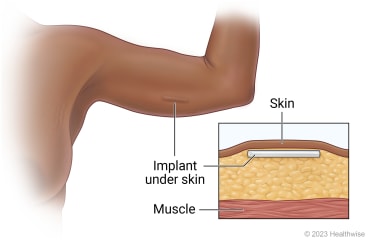Implant for Birth Control: Care Instructions
Overview

The implant is used to prevent pregnancy. It's a thin rod about the size of a matchstick that is inserted
under the skin (subdermal) on the inside of your upper arm.
The implant prevents pregnancy for up to 5 years. Talk to your doctor about how long you can use it. After it
is put in, you don't have to do anything else to prevent pregnancy.
Follow-up care is a key part of your treatment and safety. Be sure to make and go to all
appointments, and call your doctor if you are having problems. It's also a good idea to know your test results
and keep a list of the medicines you take.
How can you care for yourself at home?
How do you use the subdermal implant?
-
The implant is put in by your doctor or another trained health professional. It only takes a few minutes.
This can also be done right after you give birth. Your doctor will remove the implant when it needs to be
taken out.
-
An adhesive bandage and a tight (pressure) bandage will be placed over the site. This helps reduce
swelling and bruising.
-
Ask your doctor if you need to use backup birth control, such as a condom, for a week after insertion.
Whether you need to do this depends on where you are in your cycle.
How can you care for the insertion site?
-
Remove the pressure bandage after 24 hours. Keep the area dry.
-
Keep an adhesive bandage on the site for 3 to 5 days after the procedure.
-
If you have pain, use an ice pack or take an over-the-counter pain medicine. Some soreness or bruising is
normal.
What else do you need to know?
-
It's safe to use while breastfeeding.
-
The implant has side effects.
-
You may have changes in your period. Your period may stop. You may also have spotting or bleeding
between periods.
-
You may have mood changes, less interest in sex, or weight gain.
-
The implant can be removed at any time for any reason if you choose. Otherwise, it will be removed at the
end of its effectiveness. When the implant is removed, you could get pregnant. If you don't want to get
pregnant, your doctor can replace the implant or you can ask your doctor about other birth control methods.
-
Check with your doctor before you use any other medicines. This includes over-the-counter medicines,
vitamins, herbal products, and supplements. Birth control hormones may not work as well to prevent pregnancy
when combined with other medicines.
-
The implant doesn't protect against sexually transmitted infections (STIs), such as herpes or HIV. A
condom can be used to reduce your risk of getting an STI.
When should you call for help?
 Call 911
anytime you think you may need emergency care. For example, call if:
Call 911
anytime you think you may need emergency care. For example, call if:
Call your doctor now or seek immediate medical care if:
Watch closely for changes in your health, and be sure to contact your doctor if:
Current as of: April 30, 2024
Content Version: 14.3
Care instructions adapted under license by your
healthcare professional. If you have questions about a medical condition or this instruction, always ask
your healthcare professional. Ignite Healthwise, LLC, disclaims any warranty or liability for your use of
this information.